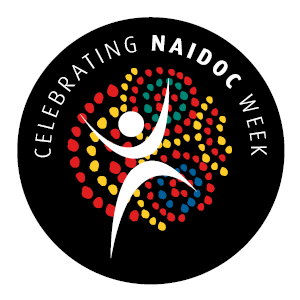Search
Search
Search results
-
Arts Access Victoria is proud to present a retrospective of work by Yorta Yorta artist Uncle Greg Muir, as part of NAIDOC Week 2023. Family, connections, home, and landscape are the overriding themes in Uncle Greg’s work, all of which come together in this selection of over fifty years of work. Th
-
Winton's NAIDOC week Celebrations
Arts, Dot Painting, Bead making, Spiritual Healer, Art and Craft, Food, Story telling -
NAIDOC 1992 Poster
Artwork by Arrernte artist Helen Kemarre Shearer. Of the artwork Shearer writes: 'These are my Dreaming stories from my mother's and my father's country - Arrernte Dreaming tracks. I lived at Atitjere Homelands, which is Harts Range on the white fellas map.
-
AOD Youth and Well-being NAIDOC Art comp 2022
An artwork comp with the theme of UNITY, all school aged young people up to age 25. Winners will be selected by artworks that best represent the theme. 2 entries per person, group. FIRST PRIZE $500 dollars. -
NAIDOC 2015 Poster
"My artwork is a combination of my photography, drawings, and graphic design work - representing the ages and colours of our Aboriginal and Torres Strait Islander people, and their strong spiritual and cultural connection to the land and the sea.
-
NAIDOC 2010 Poster
"The artwork depicts an Aboriginal mother who is an ‘Unsung Hero’ leading her children through example, showing that actions can speak louder than words.
-
NAIDOC 2014 Poster
"My artwork features three brothers with their land behind them and the horizon before the. Their Elders are reflected in the water, giving the brothers the strength to overcome what lies over the horizon.
-
NAIDOC 2009 Poster
"This artwork represents the elders teaching and keeping watch over the young as they learn and grow into adults to then carry on the culture. The painting also depicts the old ones who watch over everyone to protect and guide us through our lives.
-
Kiripapura “Clever with our hands”
Artwork of seven women artists from Ngaruwanajirri, Wurrumiyanga, Bathurst Island.
-
Ashleigh Barty AO
Ash Barty AO was born in Ipswich, Queensland. Through her great-grandmother, Ash is a member of the Ngarigo people, the Aboriginal people of southern New South Wales and north-eastern Victoria.
Welcome to NAIDOC.
We acknowledge all First Peoples of the beautiful lands on which we live and celebrate their enduring knowledge and connections to Country. We honour the wisdom of and pay respect to Elders past and present.



